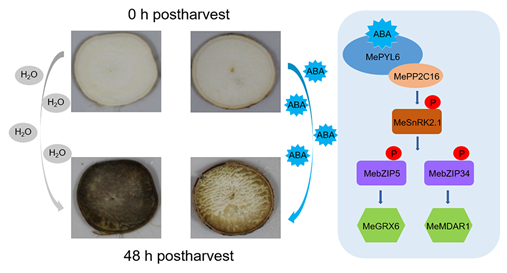Recently, the Tropical Crop Genome and Genetic Improvement Research Team of the Institute of Tropical Bioscience and Biotechnology, CATAS has made new progress in the research on the molecular mechanism of abscisic acid (ABA) regulation of cassava postharvest decay, confirmed that ABA can effectively delay the occurrence of cassava postharvest decay, and proposed a regulatory model of ABA to delay cassava postharvest decay by regulating the accumulation of active oxygen, providing a scientific basis for effective control of cassava postharvest decay.

Molecular model of ABA regulating cassava postharvest decay
Cassava is an important cash crop in the tropical and subtropical regions of China, but its root tubers are extremely resistant to storage and will rot 2-3 days after harvest, which seriously restricts the sustainable development of cassava industry. The research team found that exogenous ABA treatment can effectively delay the occurrence of post harvest decay of root tubers of several cassava varieties. Through yeast two hybrid and BiFC technology, it was found that MePYL6-MePP2C16-MeSnRK2.1-MebZIP5/34 module plays an important role in ABA delaying post harvest decay of cassava; The yeast single hybrid and double luciferase experiments further confirmed that MebZIP5 and MebZIP34 can directly act on the promoters of the antioxidant enzyme genes MeGRX6 and MeMDAR1 to activate their expression, reduce the content of hydrogen peroxide, and then delay the occurrence of postharvest decay. This study laid a foundation for prolonging the shelf life of cassava root tubers.
This research achievement was published in the Journal of Agricultural and Food Chemistry under the title of "Abscient Acid Signaling in the Regulation of Postgraduate Physical Determination of Sliced Cassava Tuberous Roots". Yan Yan, an associate researcher of the Institute of Tropical Bioscience and Biotechnology, CATAS , is the first author of the paper, Zhao Sihan, a postgraduate, is the co first author, and Hu Wei, a researcher, is the corresponding author of the paper. The research was supported by the National Key R&D Plan, the National Natural Science Foundation of China and other programs.


